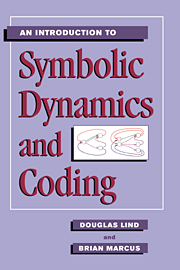Book contents
- Frontmatter
- Contents
- PREFACE
- CHAPTER 1 SHIFT SPACES
- CHAPTER 2 SHIFTS OF FINITE TYPE
- CHAPTER 3 SOFIC SHIFTS
- CHAPTER 4 ENTROPY
- CHAPTER 5 FINITE-STATE CODES
- CHAPTER 6 SHIFTS AS DYNAMICAL SYSTEMS
- CHAPTER 7 CONJUGACY
- CHAPTER 8 FINITE-TO-ONE CODES AND FINITE EQUIVALENCE
- CHAPTER 9 DEGREES OF CODES AND ALMOST CONJUGACY
- CHAPTER 10 EMBEDDINGS AND FACTOR CODES
- CHAPTER 11 REALIZATION
- CHAPTER 12 EQUAL ENTROPY FACTORS
- CHAPTER 13 GUIDE TO ADVANCED TOPICS
- BIBLIOGRAPHY
- NOTATION INDEX
- INDEX
CHAPTER 6 - SHIFTS AS DYNAMICAL SYSTEMS
Published online by Cambridge University Press: 30 November 2009
- Frontmatter
- Contents
- PREFACE
- CHAPTER 1 SHIFT SPACES
- CHAPTER 2 SHIFTS OF FINITE TYPE
- CHAPTER 3 SOFIC SHIFTS
- CHAPTER 4 ENTROPY
- CHAPTER 5 FINITE-STATE CODES
- CHAPTER 6 SHIFTS AS DYNAMICAL SYSTEMS
- CHAPTER 7 CONJUGACY
- CHAPTER 8 FINITE-TO-ONE CODES AND FINITE EQUIVALENCE
- CHAPTER 9 DEGREES OF CODES AND ALMOST CONJUGACY
- CHAPTER 10 EMBEDDINGS AND FACTOR CODES
- CHAPTER 11 REALIZATION
- CHAPTER 12 EQUAL ENTROPY FACTORS
- CHAPTER 13 GUIDE TO ADVANCED TOPICS
- BIBLIOGRAPHY
- NOTATION INDEX
- INDEX
Summary
Symbolic dynamics is part of a larger theory of dynamical systems. This chapter gives a brief introduction to this theory and shows where symbolic dynamics fits in. Certain basic dynamical notions, such as continuity, compactness, and topological conjugacy, have already appeared in a more concrete form. So our development thus far serves to motivate more abstract dynamical ideas. On the other hand, applying basic concepts such as continuity to the symbolic context shows why the objects we have been studying, such as sliding block codes, are natural and inevitable.
We begin by introducing in §6.1 a class of spaces for which there is a way to measure the distance between any pair of points. These are called metric spaces. Many spaces that you are familiar with, such as subsets of 3-dimensional space, are metric spaces, using the usual Euclidean formula to measure distance. But our main focus will be on shift spaces as metric spaces. We then discuss concepts from analysis such as convergence, continuity, and compactness in the setting of metric spaces. In §6.2 we define a dynamical system to be a compact metric space together with a continuous map from the space to itself. The shift map on a shift space is the main example for us. When confronted with two dynamical systems, it is natural to wonder whether they are “the same,” i.e., different views of the same underlying process.
Information
- Type
- Chapter
- Information
- An Introduction to Symbolic Dynamics and Coding , pp. 171 - 215Publisher: Cambridge University PressPrint publication year: 1995
